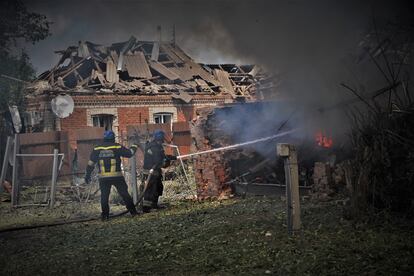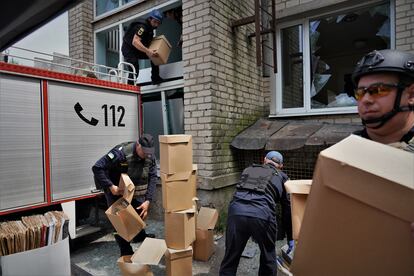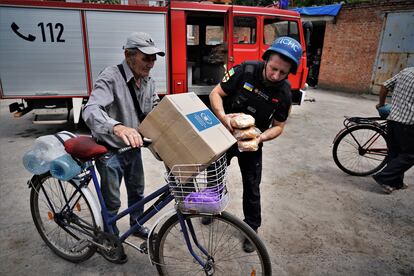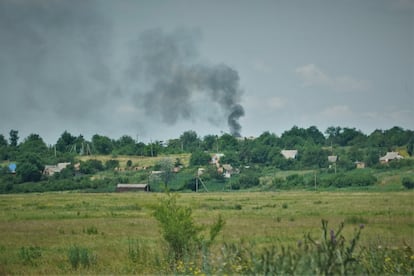Living under Russian bombardment in Orikhiv: ‘Everybody take cover!’
The Ukrainian-held city in the Zaporizhzhia region is one of the staging points for Kyiv’s counteroffensive, making it a target for daily shelling by the Kremlin’s forces


The hum of the plane’s engine over Orikhiv spreads panic, more so even than the artillery shells that have been hitting this town in the southern region of Zaporizhzhia for some time. After a few seconds of scanning the sky and listening intently to confirm the worst omens, a generalized rush to the nearest basement breaks out. “Everyone take cover!” Orikhiv, which for months was a battleground between the Ukrainian and Russian armies, is today one of the staging points for Kyiv’s counteroffensive to the south. The city is in Ukrainian hands, but it continues to be punished by Moscow’s forces.
Ukrainian President Volodymyr Zelenskiy visited Donetsk and Zaporizhzhia earlier this week and reported that his troops had advanced on all fronts. On Wednesday, Deputy Defense Minister Hanna Maliar quantified the advances to be between 1,200 and 1,500 meters south of Bakhmut and around 1,300 meters in the direction of Berdiansk, in the Zaporizhzhia region.
The noise in the sky above Orikhiv interrupts the work of a group of firemen who are emptying an official building, its windows completely blown out, of administrative documents. They have positioned their red truck to directly to extract dozens of cardboard boxes from the second floor, which contain papers and documents that make up the city’s archive. They will be moved to the city of Zaporizhzhia, before the records are destroyed by bombing.
Moments later, in the protective depths of the shelter, the firemen meet a group of soldiers. The military officer in charge is concerned by the possibility that the presence of two cameras, one belonging to the Ukrainian emergency services and the other to EL PAÍS, might reveal the coordinates of their position. At first, he rejects the explanations that all those present have restricted coverage. He asks for the images to be deleted, but after a few minutes, he relents. Activating airplane mode on cell phones is mandatory in frontline areas to prevent Russian troops from detecting positions through cell coverage.

The Ukrainian counteroffensive has its sights set on two strategic sites relatively close to Orikhiv, which are under Russian control: the Zaporizhzhia nuclear power plant and the corridor on the shores of the Sea of Azov that facilitates logistics for the Kremlin’s occupation forces. One of the targets halfway between Orikhiv and that supply line is the town of Tokmak.
Vitali Chorni, 34, was the chief of the fire station in Tokmak until last September, and he now holds the same position in Orikhiv, where there has been no water or electricity supply for months. He says that during the seven months he worked in the emergency corps under the Russian occupation he experienced no problems, but when the chance arose, dressed in civilian clothes, he escaped together with other residents. In Orikhiv, “the situation is hard and complicated, especially during the last three weeks,” he says, describing the hostilities unleashed after the Ukrainian counteroffensive was launched in the first week of June.
On the main road in Orikhiv, as in many frontline towns, a grocery store that relies on a generator to stay open serves as a meeting place and an information and supply center. While firefighters refill two large tanks of drinking water for the neighborhood, Anastasia Bolous, 26, who is married to one of them, attends to several servicemen from behind the counter. Uniformed men make up the bulk of the store’s clientele, she says. She remained in the city because, in addition to her work in the store, her parents also still live in Orikhiv: only around 10% of the pre-war population of 14,000 remains. Bread is delivered from Zaporizhzhia twice a week and is distributed to residents by the emergency services.
“We have no choice but to stay here,” says Roman Semenovic, 46, whose family is in exile in Poland. He is another employee of the same store and, in flip-flops, shorts and a tank top, goes about his work while several shells whistle through the air before striking a few hundred meters away. The notion of fear and danger seems altered among those who have been living for months in Orikhiv and other towns like it, where the war has taken root.
It is as if residents assume that nothing will prevent fate in the daily lottery of living under constant bombardment. Anastasia serves the soldiers and laughs when asked why she doesn’t panic under fire. “Sometimes I’m scared,” she says without giving it much thought. Outside, several stray dogs roam. Some become restless. Others don’t even flinch. Burnt-out cars, destroyed buildings and rubble litter the streets, where, aside from the military, civilians on foot or on bicycle can be seen from time to time.

One of the shells explodes next to several houses. The column of smoke alerts the firemen, who point their vehicle in that direction - the same vehicle that unloaded the boxes from the archive, which also distributes bread and delivers water. Now it serves its original purpose as a pump truck. They quickly unwind the hose and pull out the ladders. There was one casualty from the strike, who has already been evacuated by the time they arrive. A group of residents watch the flames devouring a building in the middle of a thick cloud that alternates between black and white.
“I’m only afraid of God,” says Vyacheslav Koutun, a 72-year-old retired artist, who has come to collect bread and a box of humanitarian aid at a municipal building. He looks with sadness at the building, a late 19th-century construction with shrapnel holes in its walls and a destroyed roof half-covered by a blue UN tarpaulin. His wife, Tamara, 66, joins the conversation: “I’m tired. Let’s see if we win the war already.” “We want to celebrate our victory here, at home, in Orikhiv. We want to eat meat and drink beer... a feast of local products,” adds Vyacheslav, pointing to the sky. People look upwards not only when they detect Russian aircraft and missiles. They also do so when they pray, as in this case, for it all to come to an end.

Sign up for our weekly newsletter to get more English-language news coverage from EL PAÍS USA Edition
Tu suscripción se está usando en otro dispositivo
¿Quieres añadir otro usuario a tu suscripción?
Si continúas leyendo en este dispositivo, no se podrá leer en el otro.
FlechaTu suscripción se está usando en otro dispositivo y solo puedes acceder a EL PAÍS desde un dispositivo a la vez.
Si quieres compartir tu cuenta, cambia tu suscripción a la modalidad Premium, así podrás añadir otro usuario. Cada uno accederá con su propia cuenta de email, lo que os permitirá personalizar vuestra experiencia en EL PAÍS.
¿Tienes una suscripción de empresa? Accede aquí para contratar más cuentas.
En el caso de no saber quién está usando tu cuenta, te recomendamos cambiar tu contraseña aquí.
Si decides continuar compartiendo tu cuenta, este mensaje se mostrará en tu dispositivo y en el de la otra persona que está usando tu cuenta de forma indefinida, afectando a tu experiencia de lectura. Puedes consultar aquí los términos y condiciones de la suscripción digital.








































